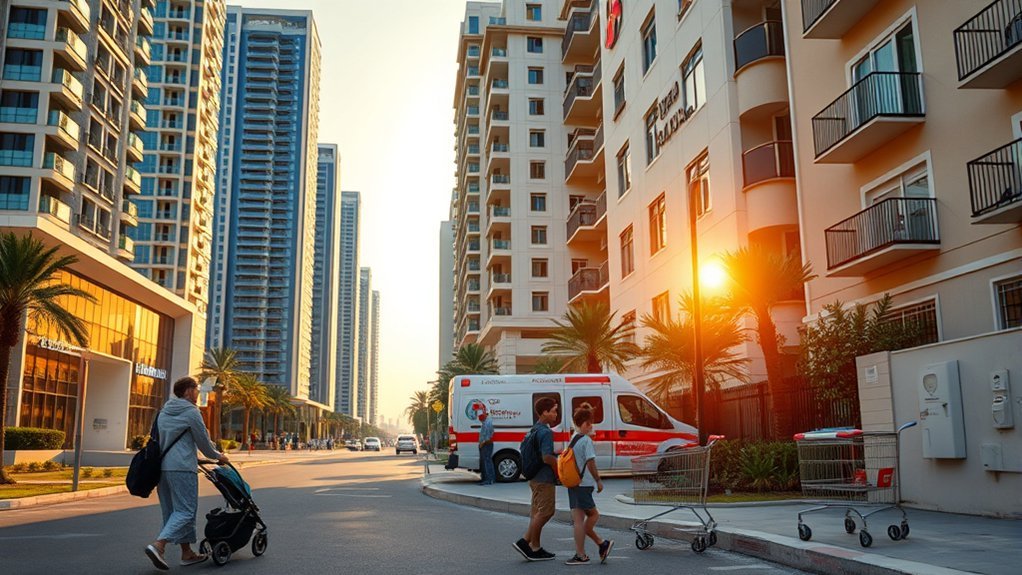You’ll typically need AED 5,000–15,000 per month in Abu Dhabi depending on housing choices and lifestyle. One-bedroom city-center rents run about AED 5,000–6,500, three-bedrooms often exceed AED 11,000, and upfront deposits are usually 1–4 months’ rent. Utilities are roughly AED 600–780 monthly, groceries about AED 1,000–1,200, and public transport passes near AED 95. Average take-home pay sits around AED 11,500, so compare costs to salary to assess affordability — more detailed breakdowns follow.
- Monthly budget: AED 5k–15k depending on rent and lifestyle.
- Rents: 1-bed city-center ~AED 5k–6.5k; 3-bed often > AED 11k.
- Utilities: ~AED 600–780; Groceries: ~AED 1k–1.2k (single).
- Transport pass: ~AED 95; Average net salary: ~AED 11.5k.
Quick Snapshot: 2025 Cost of Living in Abu Dhabi

Abu Dhabi’s overall cost of living sits below Dubai’s by about ~15.8%, with rent roughly 30–31% cheaper. For a single person, a practical baseline using a 1-bedroom city-center scenario is about AED 5,060 (baseline total, varies by lifestyle). Families using a 3-bedroom central scenario often sit near AED 15,768. City-center housing can vary: 1-bed typically AED 5,000–8,000+, while 3-bed central frequently tops AED 11,000. Utilities for an 85 m² apartment are commonly AED 608–1,200 monthly, and single-person groceries average AED 1,000–1,200. Singles excluding rent commonly spend AED 3,500–4,000, while couples/families may require AED 18,000–25,000 total monthly depending on rent and schooling.
Housing, Rent and Utilities Breakdown

Housing costs depend on location and size: one-bedroom city-center apartments typically rent for AED 5,000–6,500 monthly (around AED 3,800+ outside the center), while three-bedroom units in central areas commonly exceed AED 11,000 and range AED 8,900–12,000 elsewhere. Renting usually requires a security deposit equal to 1–4 months’ rent. Utilities for an 85 m² apartment average about AED 608 per month, rising in summer due to AC. You can lower costs via shared accommodation or by choosing suburbs.
Housing costs in Abu Dhabi vary by location and size — expect AED 5,000–6,500 for one-bed central, higher for larger units.
- Compare city-center vs. outside-center trade-offs.
- Account for summer electricity spikes in total monthly costs.
- Include deposits (1–4 months) when budgeting initial outlay.
- If purchasing, factor in mortgage fees which change effective housing cost.
Groceries, Dining Out and Weekly Food Costs

Plan for about AED 250–300 per week for groceries. A single-person basket averages around AED 300 when staples like milk (~AED 7.27), bread (~AED 5.89), rice (~AED 9.20) and eggs (~AED 13.37) are included.
Dining out varies widely — expect AED 40–250 for meals for two depending on whether you choose local fast-food, mid-range options (three-course ~AED 250) or café items like a cappuccino (~AED 20–21) and a value meal (~AED 25). Cooking at home generally lowers total spend versus frequent dining out.
Weekly Grocery Budget
Data suggests monthly groceries of ~AED 1,010–1,200 for singles, which maps to AED 250–300/week. Use this as a baseline for planned weekly lists and meal prep.
- Base essentials: milk (~7.27), bread (~5.89), rice (~9.20), eggs (~13.37/dozen).
- Protein example: chicken fillets (~15.02 AED per lb) to estimate weekly protein costs.
- Dining-out impact: value meal ~25 AED; mid-range meal for two ~40–250 AED; cappuccino ~20–21 AED.
Affordable Dining Options
Calibrate your food budget by balancing groceries and dining. Keep monthly groceries near the lower range by planning meals and shopping at value supermarkets. Limit three-course dinners (~AED 250) to occasional treats.
Home Cooking Savings
A typical weekly groceries basket for a single person is ~AED 300; that scales to monthly groceries of about AED 1,000–1,200. Track receipts to refine your Abu Dhabi budget.
Transportation, Cars and Commuting Expenses

Public transport is affordable: a one-way ticket is about AED 2.50 and a monthly pass about AED 95. Taxi fares start at AED 12, with per-km charges plus a small booking fee. When assessing car ownership, consider fuel costs and maintenance. For discretionary travel, a practical budget is roughly AED 600/month (low) to AED 1,500+/month (active lifestyle).
Salaries, Typical Jobs and Take-Home Pay

The average monthly take-home pay in Abu Dhabi is about AED 11,484. Engineers often net AED 20,000–35,000, and senior roles can exceed AED 50,000. If you earn near the average, a city-center 1-bed rent (AED 5,000–6,500) will consume a large share of your take-home pay; engineering and senior salaries leave more room for savings.
Education, Healthcare and Family-Related Costs

School fees, health insurance, and housing dominate family budgets. Private and international school fees range from about AED 2,200 to over AED 100,000 per year, depending on curriculum. For a family of four, average monthly living costs sit near AED 12,301 (ex-rent), with 2–3 bedroom rent typically AED 5,000–12,000 and utilities AED 600–1,200. Health insurance averages roughly AED 6,000 per individual and AED 20,000 per family annually; private clinic visits are commonly around AED 300.
Money-Saving Tips and Practical Budget Examples

Use these data-driven moves: compare city-center vs outskirts, estimate utilities precisely, and align spending with your net salary to set realistic savings targets. A single’s total with a 1-bed baseline (rent + essentials) of ~AED 5,060 should be benchmarked against the average net salary (~AED 11,484). Families should model 3-bed city-center totals around AED 15,768.
- Choose an apartment outside center to cut rent; 1-bed city-center ranges AED 5,000–10,000, 3-bed often exceeds AED 11,000.
- Track utilities (~AED 608–780) and optimize cooling to lower bills.
- Keep groceries near AED 1,000–1,200/month and limit mid-range dinners (~AED 250–280 for two).
- Singles often spend AED 3,500–4,000 excluding rent; aim to convert excess into 10–20% monthly savings.
Frequently Asked Questions
How Much Salary to Live Comfortably in Abu Dhabi?
You’d need about AED 12,000–18,000 monthly net to live comfortably solo in Abu Dhabi; for couples or small families, target AED 18,000–25,000. These ranges reflect typical rent, utilities, groceries, transport and discretionary spending.
How Much Does It Cost to Live in Abu Dhabi With Rent?
About AED 5,060 for a single in a 1-bed city-center baseline and roughly AED 15,768 for a family in a 3-bed city-center scenario, plus AED 600–1,500 for utilities and internet depending on usage.
Is AED 15,000 a Good Salary in Abu Dhabi?
Yes — AED 15,000 is reasonable for a single person; it exceeds the average but tightens with central rent. You’ll cover expenses and save modestly if you secure cheaper rent; family commitments may stretch this salary.
Is AED 50,000 per Month a Good Salary in Abu Dhabi?
Yes — AED 50,000/month is an excellent income in Abu Dhabi. With average net salary around AED 11,484, that level supports premium housing, strong savings, and substantial discretionary spending.
Conclusion
Abu Dhabi’s costs are higher than many places, but you can plan around the big drivers: housing, transport, food and schooling/healthcare. Use the salary ranges and sample budgets to model your scenario; then adjust housing location, utilities and dining habits to align expenses with your income.


